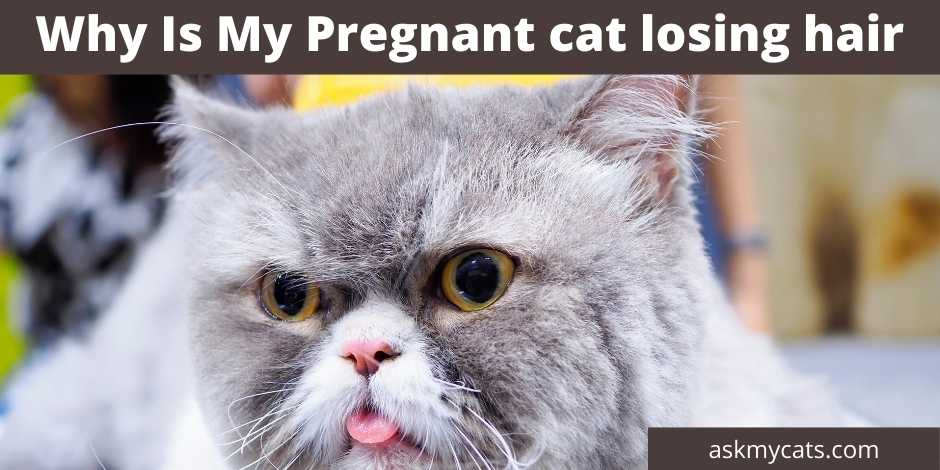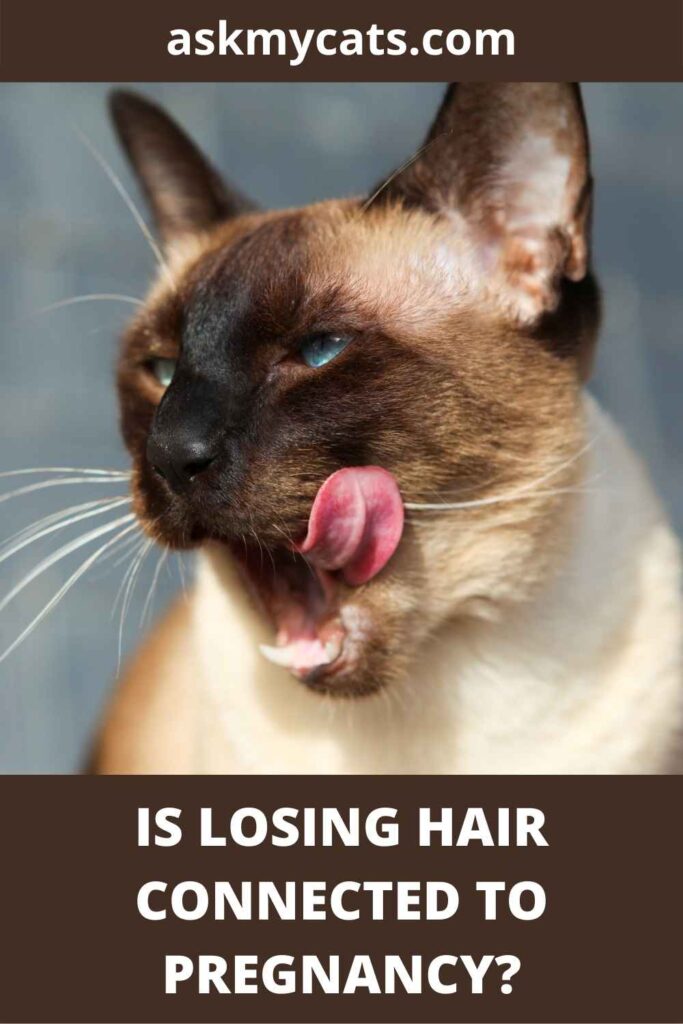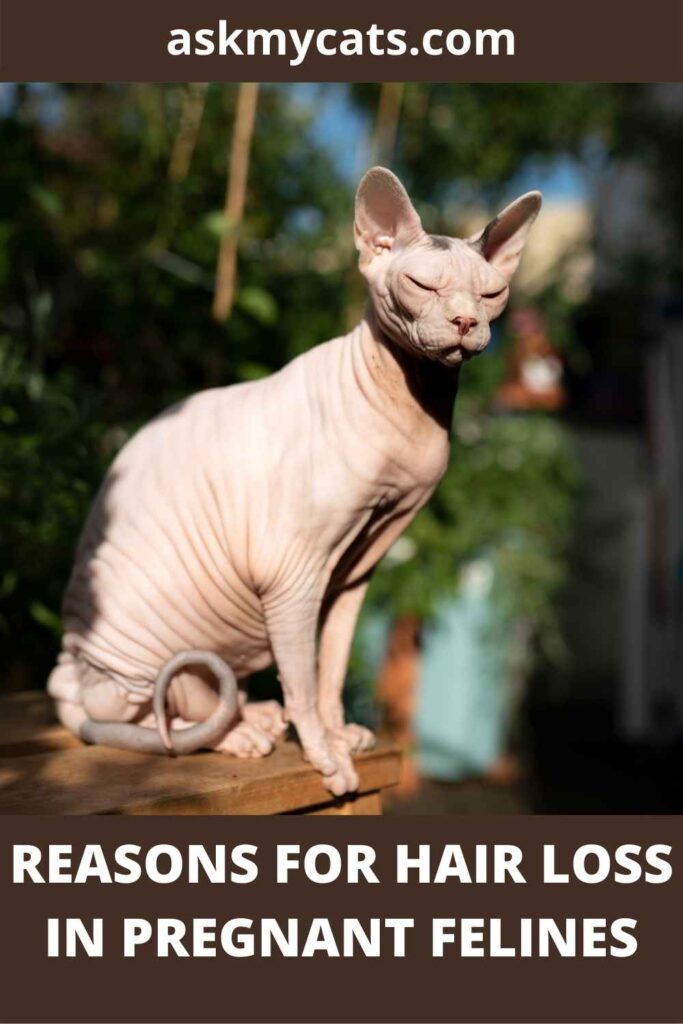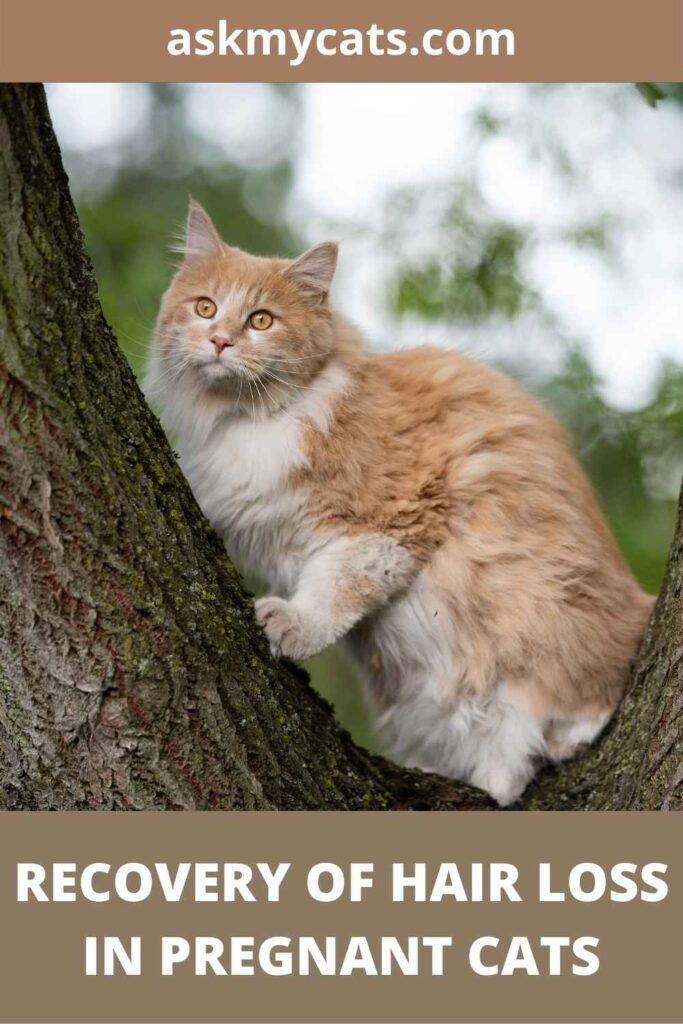There is nothing better than arriving home to discover your favorite pet curled up asleep on your favorite jacket, adorable as it can be. Even while we cherish them, their stray hairs are not always treated with the same respect.
While we cannot stop our cats’ natural shedding cycles, it’s crucial to understand when shedding is “normal” and when it is a by-product of pregnancy.
And before we dive into more different aspects of pregnancy-related aspects of losing hair;


Give Your Cat the Perfect Day
Get the Free Ebook!
Let’s Understand Why Cats Lose Their Coat
Three different forms of hair are found on cats: tactile hairs, such as whiskers, secondary hairs that are soft and fluffy, and primary hairs that are long and coarse.
Your cat may naturally get rid of damaged or dead hairs through shedding (usually secondary hairs).
Now that we have a little understanding of their fur, it is easier in to find the difference between shedding and losing hair in felines during pregnancy!
Is Losing Hair Connected To Pregnancy?
Due to the body’s hormonal changes during pregnancy, cats go through childbirth with significantly greater fur loss than typical.

Cats may become deficient in the calcium and minerals needed for a healthy coat during pregnancy and lactation.
This could cause too much shedding (or shedding out of season). Cats frequently molt their fur after giving birth or during nursing.
It can be worthwhile to put your cat or dog on a specific diet or give her vitamins to help her coat grow stronger if she gets pregnant.
According to studies, a cat may shed more than usual during pregnancy on her tummy, where her kittens will suckle.
The solution is that the excessive shedding will stop after nursing is over. Ask your veterinarian for tips on how to take good care of Mom and her babies.
Furthermore, some cats just shed more than others. If your cat is a long-haired breed like a Maine Coon or Persian, Catster advises that you should be ready for extra brushing.
Even if your short-haired cat is a mix of breeds or has an unusually thick coat, you could notice that she sheds a lot.
If your cat sheds a lot, you shouldn’t ignore the issue. A simple investment in a nice cat brush and comb, once you’ve made sure she’s in excellent health, can go a long way toward keeping your vacuum in the closet.
You might also like to read about the reasons behind cat shedding fur in clumps
Is Losing Hair during Pregnancy Normal
Losing coat/fur in pregnant felines is extremely normal and nothing to worry about.
Although it has been noticed that cats who are in labor have had a history of losing hair near their belly region more, due to their suckles, apart from this they might also shed some hair on their rear end of the body.
Cats lose hair as a by-product of the hormonal changes their body is going through, as the body needs to take care of other parts more, like nutrition, functioning of body parts, and lactation, the body does not put its attention on one basket and hair in this period is it’s last priority as the body thinks, it can survive without it.
Reasons For Hair loss In Pregnant Felines

One of the major causes of hair loss in felines in labor is:
Cat Hormones
A hormonal imbalance in your cat might also be the reason for bald spots and hair loss.
Your cat’s hair development is regulated by certain hormones, which may also be the cause of your cat’s hair loss. Hair loss can happen when these hormones are in excess or insufficient.
Due to hormonal changes at these times, you could also notice that your pregnant or nursing cat loses hair. Don’t be frightened, though; the fur will soon regrow.
Although this is the majority time the reason, she is suffering hair loss there could be other reasons the hair loss is taking place;
As her body goes through hormonal changes the feline body is vulnerable to a variety of diseases and infections.
Some typical reasons may include:
- Bacterial illnesses
- Yeast infections
- Parasitic infections
- Skin injuries
- Burns
- Allergic responses
- Birth flaw
- Hereditary disorders
- Nutritional deficiencies
- Hormonal irregularities
- Friction
- Stress
The following responses may help you identify the cause:
How often does she groom herself? Does she frequently touch herself because she feels an itch? What kind of connection does she have with the other cats you may have—is it cordial or tense? Have you made any recent changes to your house that might be stressing out your cat more?
Answering these questions will help you boil down to the actual problem and help understand who the real culprit is.
Also, check out the possible reasons behind cat losing hair on ears
When Should I Worry About My Pregnant Cat Losing Fur?
Is your cat a little less hairy now than before? Some hair loss, such as when animals lose their winter coats, is typical. But if they experience significant hair loss, something may be wrong.
Do they lick or scrape themselves all the time? Cats spend a lot of time grooming themselves—up to 50% of their waking time.
A warning sign is when your cat appears more preoccupied with licking its fur than with playing or eating.
Other than that, check the list of symptoms provided in the above section and concur if your cat is falling in any of the brackets, if it is, immediately consult your vet.
How To Treat Hair Loss In Pregnant Cat
The cause of your pregnant cat’s hair loss will determine the course of therapy, which will be determined by the veterinary team.
Due to the fact that numerous reasons do not have comparable therapeutic philosophies, therapy strategies will differ greatly.
There is no cure for some conditions, such as genetic or congenital hair loss, but if the hair loss is only due to her pregnancy with no complications found by the doctor, then a few months after giving birth she will re-develop her hair growth pattern and you are good to go.
Recovery Of Hair Loss In Pregnant Cats
The likelihood of recovering from pregnancy hair loss might vary depending on whether the condition was brought on by the pregnancy, an infection, or a complex combination of both.

Given that it is a side effect of pregnancy, hair loss, whether entire or partial, may not be irreversible, particularly when follicular problems are to blame.
The prognosis is often favorable following treatment of the underlying cause of infections or other curable disorders that were the source of the loss.
Follow all of your veterinarian’s instructions, keep an eye on your pet’s condition, provide the whole course of medicine, and return for more treatment if things become worse.
Your cat’s rehabilitation will be aided by lowering the stress in their living space and providing them with a portion of nutritious food.
Don’t make any significant modifications until your pet is fully recovered. Your pet can still lead a full life even if hair loss is irreversible.
Find out more details about how long does cat hair take to grow back
Frequently Asked Questions
Is it normal for pregnant cats to lose hair?
After giving birth or while nursing, cats frequently lose their fur. So it is completely normal.
Do pregnant cats lose hair around their nipples?
As a natural tendency to make the nipples easier for her future offspring to discover, your cat may start to lick the area surrounding them to remove the fur.
Why does my cat have a bald patch on her belly?
If your cat is purposefully licking her hair away, she may be pregnant. A bald patch on your cat might vary in appearance, and she may have multiple places of fur loss or only one or two.
Final Words
Depending on the underlying reason, recovery time for cats with pregnant hair loss can range from a few weeks to several months. Your cat’s hair will probably grow back if the root problem is found and the right course of action is taken.
For the greatest results, it’s crucial to collaborate closely with your veterinarian and adhere to their recommendations for follow-up appointments.
If your cat losing hair after giving birth, then you must check out this article: Cat Losing Hair After Giving Birth: Is This Normal?
Interesting Read: Do Black Cats Shed?
